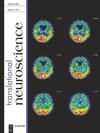Single-cell analysis of gene expression in the substantia nigra pars compacta of a pesticide-induced mouse model of Parkinson’s disease
IF 1.8
4区 医学
Q4 NEUROSCIENCES
引用次数: 1
Abstract
Abstract Exposure to pesticides in humans increases the risk of Parkinson’s disease (PD), but the mechanisms remain poorly understood. To elucidate these pathways, we dosed C57BL/6J mice with a combination of the pesticides maneb and paraquat. Behavioral analysis revealed motor deficits consistent with PD. Single-cell RNA sequencing of substantia nigra pars compacta revealed both cell-type-specific genes and genes expressed differentially between pesticide and control, including Fam241b, Emx2os, Bivm, Gm1439, Prdm15, and Rai2. Neurons had the largest number of significant differentially expressed genes, but comparable numbers were found in astrocytes and less so in oligodendrocytes. In addition, network analysis revealed enrichment in functions related to the extracellular matrix. These findings emphasize the importance of support cells in pesticide-induced PD and refocus our attention away from neurons as the sole agent of this disorder.农药诱导的帕金森病小鼠模型黑质致密部基因表达的单细胞分析
人类暴露于农药会增加帕金森病(PD)的风险,但其机制尚不清楚。为了阐明这些途径,我们给C57BL/6J小鼠注射了农药马草和百草枯的组合。行为分析显示运动缺陷与PD一致。对黑质致密部单细胞RNA测序发现了细胞类型特异性基因和农药与对照差异表达基因,包括Fam241b、Emx2os、Bivm、Gm1439、Prdm15和Rai2。神经元中显著差异表达基因的数量最多,但星形胶质细胞中差异表达基因的数量相当,少突胶质细胞中差异表达基因的数量较少。此外,网络分析显示与细胞外基质相关的功能富集。这些发现强调了支持细胞在农药诱导PD中的重要性,并将我们的注意力从神经元作为这种疾病的唯一因素重新集中起来。
本文章由计算机程序翻译,如有差异,请以英文原文为准。
求助全文
约1分钟内获得全文
求助全文
来源期刊

Translational Neuroscience
NEUROSCIENCES-
CiteScore
3.00
自引率
4.80%
发文量
45
审稿时长
>12 weeks
期刊介绍:
Translational Neuroscience provides a closer interaction between basic and clinical neuroscientists to expand understanding of brain structure, function and disease, and translate this knowledge into clinical applications and novel therapies of nervous system disorders.
 求助内容:
求助内容: 应助结果提醒方式:
应助结果提醒方式:


